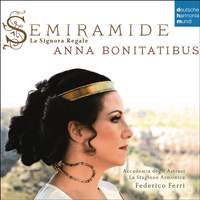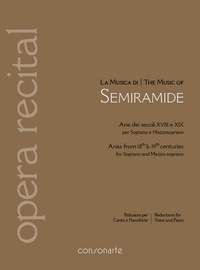Interview,
Anna Bonitatibus on Semiramide
 The ancient Babylonian queen Semiramide is surely rivalled only by Cleopatra in terms of the myths, legends and conflicting narratives which have grown up around her. Represented variously as goddess, virago, witch, warrior, seductress and matriarch, she has inspired dozens of operas (proving a particularly popular subject during the eighteenth century) but only Rossini's Semiramide (1823) has established itself as part of the core operatic repertoire today.
The ancient Babylonian queen Semiramide is surely rivalled only by Cleopatra in terms of the myths, legends and conflicting narratives which have grown up around her. Represented variously as goddess, virago, witch, warrior, seductress and matriarch, she has inspired dozens of operas (proving a particularly popular subject during the eighteenth century) but only Rossini's Semiramide (1823) has established itself as part of the core operatic repertoire today.
The Italian mezzo Anna Bonitatibus's fascinating new project seeks to redress this balance, taking us on a journey which beings with Porpora and ends with Rossini (unearthing rarities by Caldara, Traetta, Meyerbeer and many others along the way) and exploring the many contrasting faces of the character and different versions of her story.
Almost all of these arias are world premiere recordings, and range from virtuoso fireworks to hauntingly simple laments. The two-CD set also comes with a series of illuminating essays by Anna on Semiramide, her myths and her music; you can also watch a rather fabulous short film-trailer, shot on location in Italy, via the link on the product-page below.
Anna's long been one of my favourite bel canto and baroque singers, and so it was a particular pleasure to pick her brains on this project a few days ago...
Photograph ©Consonarte: Frank Bonitatibus
Semiramide is such a fascinating, multi-faceted character - when did you first fall under her spell, and how did you set about researching her story and her music?
It was one of my wishes to work on a new project that could recount just how important Music, Opera, and Art in general is to our lives today more than ever despite those who think that opera is near to an end and recordings are just a question of marketing and business. Semiramide appeared extremely fascinating and perfect for this reason. Since my first researches, I found she was misunderstood as a queen and especially as a woman, which to me, is not a matter of a century or a millennium, is a point of strength and also a point of reference. We introduce her true story first and then we continue with the layers of myth surrounding her.
As these two discs testify, she was one of the most popular subjects for operatic composers during the baroque and early Classical period - why do you think she was so attractive to composers at this point in time?
Opera was in history always a fruit of a balance of many aspects: enterprise, creativity, art, but also entertainment, interpreters, venue of rendezvous, ideas, mirror of society and of course much more. It was a specialty of classicism to create “opera seria” with subjects from the ancient world and Semiramide represented one of the most interesting story and legend at the same time. In fact, it was a subject that was particularly successful since audiences knew the story so well that in some of the representations of the libretto became a topic for “opera buffa.” When translated in modern terms, is similar to a satire about a politician or a famous person: the true temperature of the success of a subject.
There's definitely something of the Amazon about Semiramide, with strong masculine and feminine elements to her character - were any of these roles written for castrati, or were they all intended to be sung by female singers?
Yes, there are a few written for “evirati cantori,” but let me note here that depending in which state Operas were performed, women were banned from stage (remember Italy was only recently united in 1861!). This is the case of our La morte di Semiramide by Nasolini, a very famous composer in his time, in which the role of Semiramide was interpreted by Giovanni Spagnoli for the premiere in Roma (Stato Pontificio at the time) as well as Paisiello's version La Semiramide in villa premiered in Roma whose first interpreter was Fedele Venturi.
How much variety in characterisation is there across the works on the disc? Do different composers place different emphasis on her many roles as mother, warrior, seductress etc..?
This is specifically the reason for this recording. I invite everybody interested in this fascinating story to discovery each aspect. I tried to propose with special care this path.
Apart from the Rossini setting, most of these operas are completely unknown today - can you tell us whether you have plans for staged revivals of any of the works on the disc?
This would be a dream. I think that the purpose of recording today isthe discovery of treasures that can enlighten new programs but also represent new inspiration for the music of the future. I declare here (smiling..) my complete disposal for any institution that would like to continue our work and represent on stage an entire opera between the copious titles dedicated to Semiramide.
Semiramide - La Signora Regale is out now on Deutsche Harmonia Mundi, and features arias from operas by Caldara, Porpora, Rossini, Meyerbeer and others.
Available Formats: MP3, FLAC, Hi-Res FLAC
Arias from 18th & 19th centuries for Soprano and Mezzo-soprano
Available Format: Sheet Music
You can browse the completely available Consonarte catalogue over on our sheet-music site.




